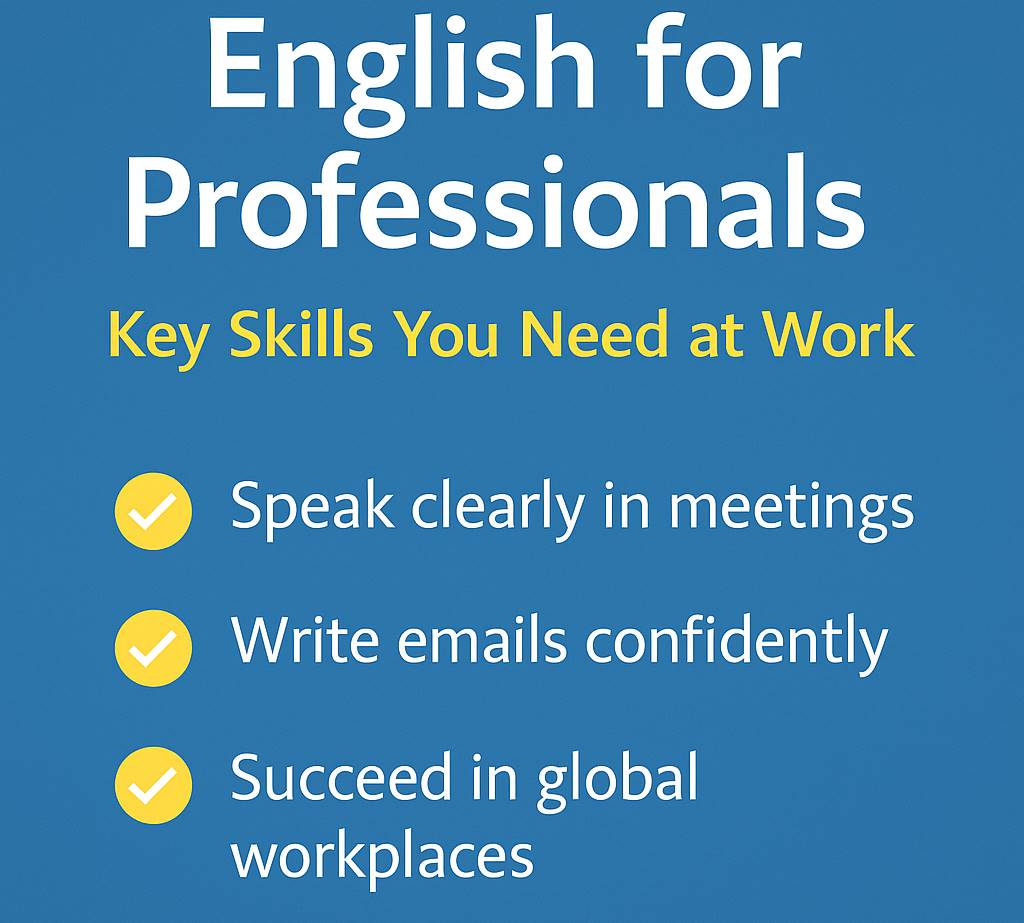
Amanda White
June 17, 2025
No Comments
Mastering Workplace English: What Professionals Really Need
Clear and confident English for professionals is no longer a luxury—it’s a necessity in global workplaces. Whether you’re leading a virtual meeting, emailing clients, or networking at conferences, your ability to use English fluently impacts your credibility and effectiveness. This need cuts across industries, roles, and seniority levels.
In professional settings, the right tone and vocabulary can make or break a message. Common english skills for work include clarity in speech, tone sensitivity, grammar accuracy, and cultural nuances. For instance, saying “Let’s circle back on this” during a meeting is a common idiom in business English that conveys professionalism and collaboration.
Employers value team members who can write succinct reports, present with impact, and handle sensitive conversations with diplomacy. The rise of remote work has made workplace communication English skills even more essential. It’s no longer just about speaking—it’s about expressing yourself clearly through emails, chats, and presentations.
For example, a team leader in Germany may use English to coordinate with tech partners in India and a marketing agency in the U.S.—all within a single day. These professionals need consistent fluency and the ability to adapt their communication style to various English-speaking cultures.
For a practical look at the kinds of tasks strong communicators handle, check out this Communication Job Description and Common Role Tasks.
Fluency in English for professionals helps avoid costly misunderstandings, improve efficiency, and enhance leadership presence across global teams.
Table of Contents
Essential Speaking and Listening Skills in Professional English
For many professionals, speaking in front of an audience—or even in a small group—can be daunting. Yet one of the most valuable aspects of english for professionals is the ability to speak with clarity, confidence, and control. This includes pronunciation, tone, and the strategic use of pauses.
Strong speaking skills aren’t only about sounding good. They involve organizing your thoughts logically and using language that fits the audience. For example, in a product pitch, you might say, “This solution increases efficiency by 27%,” instead of “This is better.” That’s where english skills for work come in.
Listening is equally important. Professional environments require active listening—not just hearing words but understanding meaning, intent, and emotion. Practicing this improves collaboration and reduces conflict.
These skills also play into workplace communication English, especially during feedback sessions or negotiations. A great communicator listens attentively, clarifies points, and summarizes agreements. This keeps conversations focused and productive.
To develop your speaking and listening skills, many turn to programs like Learn English with online English teacher. These sessions offer one-on-one practice and targeted feedback.
This area of english for professionals helps you contribute more powerfully in team meetings, deliver persuasive presentations, and handle cross-border collaborations.
Writing with Precision: Emails, Reports, and Formal Messages
Writing is one of the most visible signs of your professionalism. Well-written communication demonstrates respect, efficiency, and attention to detail—core traits associated with effective english for professionals.
In business settings, you’re expected to compose emails that are clear, concise, and polite. Common structures include a clear subject line, brief introduction, main message, and call to action. These formats fall under best practices for english for business use.
Professionals also need to write proposals, meeting notes, performance reviews, and sometimes marketing content. Each requires different tone and vocabulary. For instance, a formal report might begin, “The purpose of this document is to summarize the Q2 results.” In contrast, an internal memo might start, “Quick update on this week’s priorities.”
Accuracy is critical—grammatical mistakes can damage credibility. The more you write, the more important it becomes to master formal structures and editing techniques. These are covered extensively in a professional English course.
Need a deeper understanding of audience expectations in professional settings? Check out this guide on External Communication Definition and Business Examples.
Developing written skills as part of your english for professionals journey boosts clarity, fosters trust, and helps ideas land effectively across global teams.

How to Practice English for Business Use Daily
To build lasting skill in english for professionals, it’s important to practice every day. But practice doesn’t mean memorizing grammar rules. Instead, immerse yourself in work-related scenarios.
Start your day reading news summaries from sources like BBC or Bloomberg and note useful expressions. When replying to work emails, take a moment to refine your phrasing. Keep a journal in English where you reflect on meetings or write about projects you’re managing.
These small habits improve english skills for work over time. They train your brain to switch to English mode more naturally. Another great method is to role-play common situations—introducing yourself in meetings, explaining a process, or giving performance feedback.
If you collaborate internationally, expose yourself to different accents and communication styles. Listening to podcasts or YouTube content in English broadens your understanding of workplace communication English.
Programs like Guide to Teaching English Communication Effectively offer resources tailored for trainers and learners alike.
This deliberate practice makes english for professionals a reflex, not a struggle.
Choosing the Right Professional English Course
Not all programs are created equal. When selecting a professional English course, look for ones that simulate real business contexts. These courses should focus on email writing, meeting communication, problem solving, and client interaction.
You’ll benefit more from scenario-based learning than from textbook drills. Ideal programs also include peer feedback, instructor evaluation, and regular progress tracking.
Look for content that covers formal English training, especially in cross-border communication, persuasion skills, and business etiquette. These are critical components of advanced english for business use.
Before committing, assess your current strengths and gaps. Are you more confident in writing but nervous speaking? Or is your vocabulary strong but grammar weak? The right course will match your profile and stretch your abilities where needed.
Also consider the format—online learning like Learn English with online English teacher offers flexibility and global access.
A well-chosen professional English course accelerates growth and builds a lifelong foundation for workplace fluency.
The Role of Formal English Training in Career Development
Advancing your career isn’t only about technical skills. Communication is often what sets top performers apart. That’s why formal English training is gaining importance in employee development programs.
This training focuses on structure, tone, diplomacy, and cultural sensitivity—key elements of global business success. You’ll learn how to influence decision-making, resolve conflict, and lead with presence.
Many leadership tracks now include english for professionals as a core competency. For example, multinational firms often require senior staff to complete business English certifications or attend immersive language retreats.
Combined with strong english skills for work, formal training ensures you not only speak correctly but lead effectively. It also prepares you for media appearances, keynote speeches, and client negotiations.
To see how these skills align with communication roles, read What Corporate Public Affairs Means for Modern Companies.
Investing in formal English training is a strategic step toward global mobility and promotion.
Connecting with CorporateEnglish.biz for Personalized Training
Every professional journey is unique. That’s why tailored english for professionals coaching can be transformative. Whether you’re preparing for a big presentation, managing a global team, or simply wanting more confidence in meetings, our platform is designed to help.
We offer one-on-one classes with native speakers, customized lesson plans, and a flexible schedule to fit your workday. Our clients include executives, engineers, marketers, and team leaders from across Europe and Asia.
If your company is building a learning and development plan, or you’d like to introduce English support for remote teams, reach out to us.
To learn more or start a conversation, visit our Contact Us | CorporateEnglish.biz page.
Mastering english for professionals is not a one-time event—it’s a continuous journey. Let’s walk it together.
Latest Blog
More on Corporate English Training
Learn English at Ease with
Learn english at ease with easy-to-follow techniques for improving your business fluency and confidence

Business English Teacher Jobs in
Business english teacher jobs offer opportunities to work with professionals in global companies improving



Free PDF of the Business
The business communication workbook skills and strategies for the working world pdf free download





